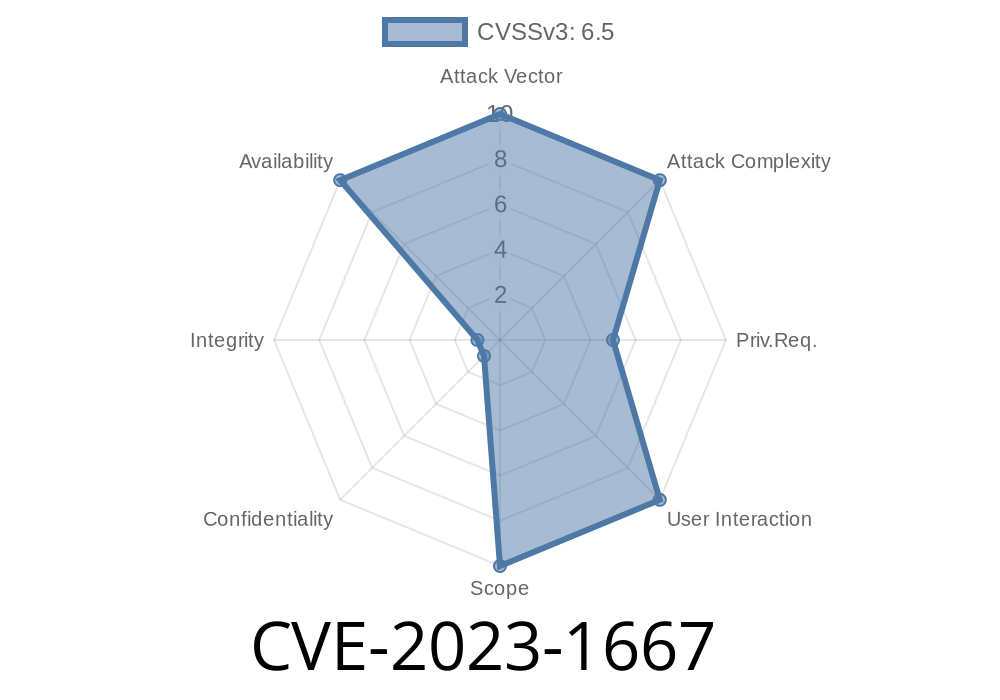Security vulnerabilities in popular libraries can have a big impact, and libssh is no exception. In 2023, researchers discovered CVE-2023-1667, a bug that could let an authenticated client bring your SSH service down by crashing it. The heart of this bug: A NULL pointer dereference in libssh during key-exchange with algorithm guessing. In this post, we'll break down what the vulnerability is, how it works, and what you can do about it.
What Is libssh, and Why Does It Matter?
libssh is a widely-used C library that provides SSH client and server functionalities. Many applications and embedded devices rely on it for secure communication.
A bug in libssh, especially one that lets authenticated users crash the service, can be a big deal. It’s a type of Denial-of-Service (DoS) vulnerability: the attacker can’t break in, but they can make your system useless until you restart your SSH service.
Where’s the Bug? (The Technical Details)
CVE-2023-1667 is all about *re-keying*–the process SSH uses to refresh encryption keys for ongoing sessions. When a client tries to renegotiate the encryption algorithms (this is called “algorithm guessing”), libssh mishandles the logic, ends up working with a NULL pointer, and crashes.
Let’s zoom in on the vulnerable code from libssh .10.4. The core of the issue is here (simplified for clarity):
/* Inside kex.c */
static int ssh_server_kex_init(ssh_session session, ssh_buffer packet) {
...
if (session->server_kex.algorithms == NULL) {
ssh_set_error(session, SSH_FATAL, "No server kex algorithms");
// Next line dereferences NULL pointer!
return ssh_packet_kexinit_session(session, packet);
}
...
}
Here’s what’s happening
- Normally, session->server_kex.algorithms should point to a list of supported key exchange algorithms.
- If that pointer is NULL (e.g., because of an unexpected or outdated negotiation from the client), the code tries to handle it — but very soon it calls a function that expects a valid pointer and dereferences NULL, causing a crash.
How Can This Be Exploited?
Attackers need to be authenticated (i.e., they need valid user credentials). Here’s a simple exploitation path:
Log in to the SSH server with a valid account.
2. Force a re-key operation by requesting new encryption parameters and use a crafted list of algorithms to trigger the bug.
libssh hits the buggy code and crashes: service is down until it’s manually restarted.
Proof-of-Concept (PoC) in Python Using Paramiko:
While paramiko uses its own SSH implementation, you can tweak it to send a re-key at the right moment and trip a vulnerable libssh server.
import paramiko
client = paramiko.SSHClient()
client.set_missing_host_key_policy(paramiko.AutoAddPolicy())
client.connect('target.server', username='validuser', password='validpass')
# Trigger re-key (the real PoC would send crafted packets, but this is the idea)
transport = client.get_transport()
transport renegotiate_keys() # not available in paramiko, but you get the idea
client.close()
A full PoC would need raw packet crafting, but the principle is the same. Once the crash is triggered, SSH is out.
Security advisory:
libssh bug report:
libssh Security Advisory (official)
Patch:
Immediate Action:
- If you run a public-facing libssh-based service, restrict SSH access only to trusted users whenever possible.
Update to libssh .10.5 or later.
The bug is fixed there. Get it from the official site.
Conclusion
CVE-2023-1667 is a great example of why *even small pointer mistakes can crash your system*. By understanding this bug and patching quickly, you can protect your service from accidental or malicious downtime. Don't leave your SSH doors open to denial-of-service: update your libraries, and stay safe!
*Written exclusively for your reference. Please use responsibly!*
Timeline
Published on: 05/26/2023 18:15:00 UTC
Last modified on: 06/06/2023 15:02:00 UTC
